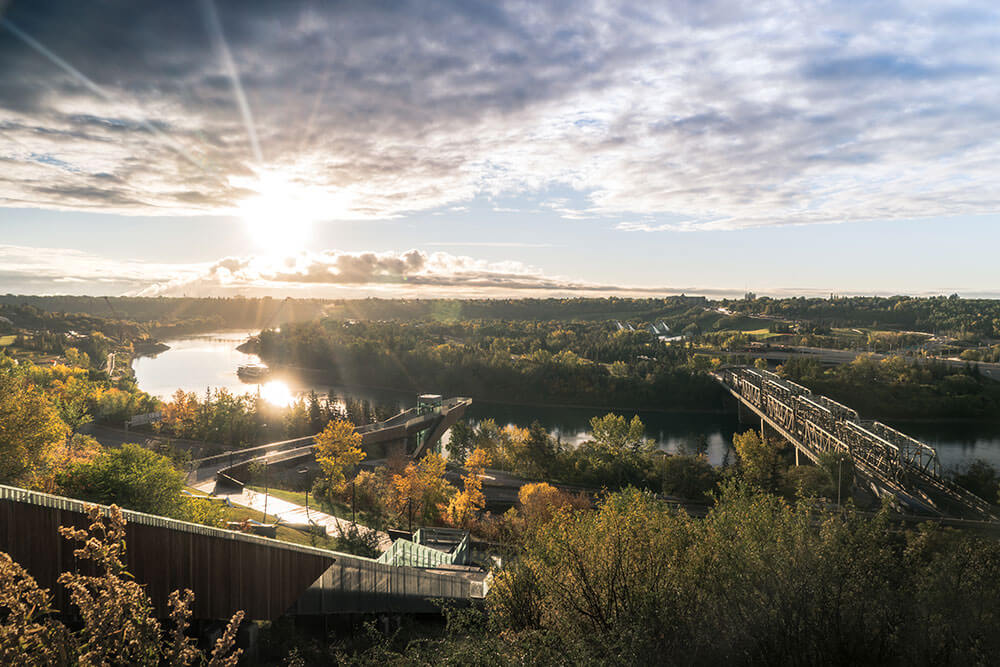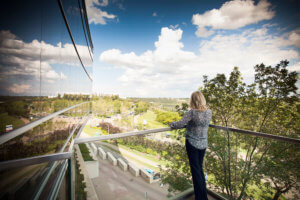
An outdoor stairway snakes from the Edmonton Convention Centre to a perch above the North Saskatchewan River. The ECC sources 60 percent of its food locally and has an urban beehive, three gardens, and a living wall.
Cities emit more than 70 percent of the world’s carbon dioxide, according to an analysis revealed at the inaugural Cities and Climate Change Science Conference sponsored by CitiesIPCC and held March 5-7, 2018 in Edmonton, Alberta, Canada. These types of statistics are why more than 800 professionals— from the academic to policy-making sectors — from around the world convened for the CitiesIPCC event to discuss how urban areas can fight climate change. While the conference wrapped more than a year ago, its effect on Edmonton, a destination chosen because of its dedication to sustainability, remains strong.
“What an amazing opportunity,” Edmonton Mayor Don Iveson said ahead of the conference. “[It’s] a chance for experts from around the world to come here to Canada, so we can all deepen our knowledge of climate change science and learn more about how we can work together to meet this complex global challenge.”

A woman looks out over the North Saskatchewan River Valley from the Edmonton Convention Centre.
Because of the event, several citywide initiatives have come to fruition. The city of Edmonton, along with the Edmonton Economic Development Corporation (EEDC), for instance, created a public program that invited Edmontonians (with a strong focus on indigenous communities) to attend presentations, performances, and art displays. More than 1,500 locals attended last year, and now the Change for Climate Community Event is part of a five-year program which, to date, has 1,655 members who continue to make personal commitments to changing their daily habits.
It was important to the organizers of the CitiesIPCC event that they work only with venues and organizations as dedicated to sustainability as they are, which led them to the Edmonton Convention Centre [ECC], which formerly was the Shaw Conference Centre. Last year, the ECC diverted 67 percent of its food and waste from landfills through recycling, composting, and donating to Edmonton’s Food Bank. Located in the heart of downtown, overlooking the North Saskatchewan River Valley, the ECC also sources 60 percent of its food locally and has an urban beehive, three gardens, and a living wall. Plus, plants in the venue’s atrium absorb nearly 4,000 pounds of CO2 each year.
The ECC is also launching a “Sustainable Meetings” program that will help event planners shrink their conference’s carbon footprint through recycling programs, and measure their impact through waste and sustainability audits. Organizers also can work with the ECC to incorporate corporate social responsibility and sustainability goals into their events, ensuring their companies leave positive legacies in Edmonton.
Hotels surrounding the convention center, such as the Sutton Place Hotel and the Fairmont Hotel Macdonald, also are committed to sustainability, having been retrofitted with low-flow toilets, faucets, and showers. The Fairmont Hotel Macdonald offers eco-friendly cleaning and the option for guests to forgo daily washing of towels and linens. Similarly, the Westin Edmonton’s “Make a Green Choice” program creates incentives for guests to decline daily housekeeping.
“Cities are already leading the charge to combat climate change and Edmonton is proud to stand side by side with the other cities around the world taking courageous action,” Iveson said earlier. “With the majority of the world’s population living in urban centers, we need to strive to make cities even healthier and more sustainable to live in and tackling climate change is part of the solution.”

The Walterdale Bridge over the North Saskatchewan River has three automobile lanes and improved pedestrian and cyclist crossings. (Images courtesy Edmonton All In)

